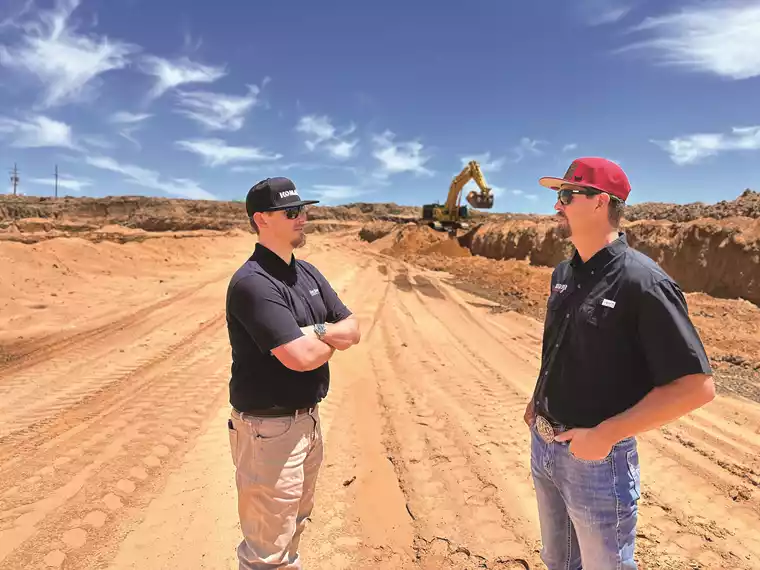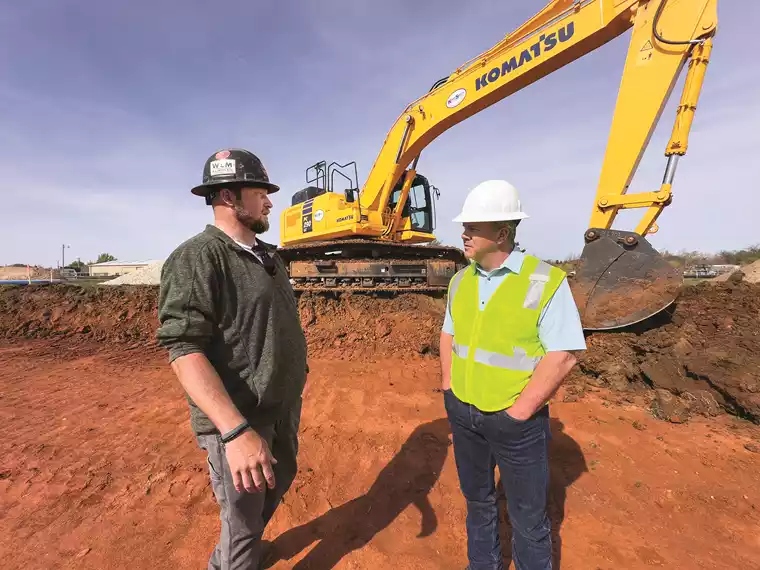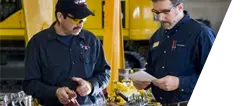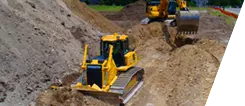Oklahoma-based contractor continues to see success by focusing on quality customer service
Hammer Construction Inc. has officially been in business for about 30 years, but its roots stretch back to when Jack Hammer founded Hammer Construction and Dozer Service in the 1950s. He focused on building roads, pits and pad sites for drilling rigs and providing roustabout services for energy companies.
Jack retired in the late 1980s, and his daughter Shirley Hammer took over and changed the name to simply Hammer Construction Inc. She also branched out to offer site work services to the commercial market. By 2016, Hammer Construction’s projects were almost evenly split between commercial and energy.
During that same year, her son-in-law Robby Moore took full control of Hammer Construction as owner and president upon Shirley’s retirement. Moore joined the company about 17 years ago on a part-time basis working in its corporate office.
“I really wasn’t planning on being with Hammer Construction on a permanent basis,” Moore admitted. “I was just filling a gap and helping the family. As the business evolved, I realized it was a good career fit for me. I’m glad it worked out the way it did.”
Other management personnel of the 100-member staff include Vice President of Operations Mark Brown and Human Resources Director Megan Swart. In addition to its corporate office in Norman, Okla., Hammer Construction has multiple field offices across Oklahoma and northern Texas.
“We like to say that we’ve got air in our tires and will go wherever there is an opportunity,” Moore said. “In reality, most of our commercial jobs are within about an hour of Norman. Energy work takes us a little farther out, but not like several years ago when we had offices in Kansas, Louisiana and Pennsylvania. That’s when oil field projects made up the vast majority of our workload.”
Broadening services
“Today, our commercial excavation and utility services make up a sizable portion of our projects,” stated Moore. “Energy services — including our roustabout, excavation and trucking departments will continue to be a staple here at Hammer.
“The type of work we specialized in on the energy side, especially earthwork, translated well to commercial,” he explained. “About a decade ago, we decided to broaden our services to include commercial, and it’s paid off.”
Hammer Construction’s commercial side provides complete site packages or individual services for customers, including clearing, mass earthwork and fine grading, utility installation, and concrete paving.
“We, and most of our clients, prefer for us to do a turnkey project where the civil construction schedule is in our hands,” said Moore. “In those cases, we self-perform nearly everything and work with trusted partners to get certain items taken care of. We are not opposed to breaking out and doing a dirt- or utility-only job. Whatever the customer wants, we will take care of it. That’s helped us build a solid list of customers that we continue to work for on a repeat basis.”
Saving time with iMC
Typically, Hammer Construction has 15 to 20 projects in the works at a time. In a recent commercial venture, the company provided earthwork for the first phase of a new multipurpose sports complex in Midwest City, Okla., that will include three baseball fields, concession stands and parking. A crew performed cut/fill operations for general site construction, which involved moving thousands of yards of dirt.
“The project is an excellent example of what Komatsu intelligent Machine Control equipment is capable of,” stated Foreman Josh Swafford. “In some places, there were 12-foot cuts and fills. Traditional methods would have meant having a survey company come out four or five times to stake it as we progressed. Because the intelligent machines always know where they are in relation to final elevation, much of that is eliminated, so we save time and money by using them from start to finish.”
Hammer Construction used its D61EXi-24 dozer and PC360LCi-11 excavator for everything from rough cut to final grading. Similar to all projects done with intelligent Machine Control (iMC) equipment, it built a site model from a CAD file Hammer Construction received from the general contractor.
“We upload the model to the machines, do a final precheck and go,” said Foreman Matt Swafford. “The integrated GPS control of the iMC machines is extremely accurate. We have never had an issue in the three-plus years that we have used them. Our first unit was a D65EXi-18 that we rented for an oil field job. We bought it because we knew right away it was a game-changer for us. With no masts or cable to put up and take down, our production time increased, so we are able to finish projects faster with reduced costs.”
Kirby-Smith Machinery Inc. Territory Manager Ryan Bebee helped Hammer Construction acquire its iMC machines — as well as standard Komatsu equipment and WIRTGEN GROUP products — and Kirby-Smith construction technology team members assisted with setup and training.
“Ryan and Kirby-Smith have been with us every step of the way in integrating the iMC machines into our fleet, as well as providing excellent service with the Komatsu Care program on all our new Tier 4 Komatsu equipment,” said Moore. “What really stands out to me is that I have worked with the same people for a long time. It makes things easier when you have familiar faces and contacts to deal with. They are knowledgeable about what machines best fit my operations, so we are most effective. They have been a good partner for us.”
Optimistic about the future
Moore said he plans to add more iMC machines to his fleet going forward. Hammer Construction will use them on both commercial and energy services projects.
“I’m optimistic that we have some good opportunities ahead of us in both sectors,” said Moore. “As always, we will continue to try and improve on what we do.”











